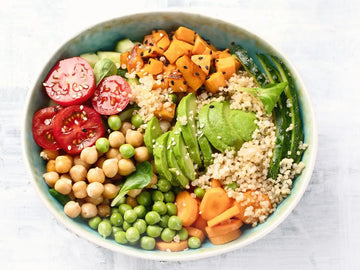Everything you should know about the vegan diet
for Baia Food en Feb 21, 2025
Tabla de contenidos
In recent years, diets such as the vegan, paleo, raw vegan, and macrobiotic diets, to name a few, have been emerging and becoming popular. They all have well-defined guidelines. markhere are some pros and cons. Let's focus on the vegan diet next, and decipher what it consists of.
Vegans do not consume anything of animal origin, meaning they do not include meat, fish, dairy products, eggs, or honey in their diet. Strict vegans also do not use cosmetics that include ingredients derived from animal products or tested on animals, nor do they wear fabrics such as leather, wool, fur, or silk.

All of this is often for ethical reasons related to animal rights, the environment, health, and/or spiritual or religious concerns. A determining factor for many vegans is the way animals are raised on factory farms and the intensive use of land by livestock.
Several studies have confirmed that a healthy and balanced vegan diet can be beneficial in reducing the risk of cardiovascular disease, preventing colon cancer, osteoporosis, diabetes, hypertension, and obesity.
For a vegan diet to be sustainable in the long term, it is very important to consume an abundance of a wide variety of fruits and vegetables, legumes, seaweed, whole grains, seeds, and nuts, and in certain cases (illness, pregnancy) always consult with a specialist about whether or not it is appropriate to take supplements.

A typical vegan diet menu could be:
BREAKFAST: Green juice with spirulina / Oat flakes with coconut milk, chia seeds, banana and red berries.
MEALSpinach and avocado salad with brown rice and hemp seeds / Legumes (chickpeas, lentils, beans) cooked with vegetables.
DINNER: stir-fried vegetables with tempeh (fermented soy protein)
Between meals: fruit, nuts, goji berries, brown rice cakes with avocado, or a smoothie with the superfoods of your choice.

The problem with a vegan diet is when it's followed unsupervised and without knowledge, which can lead to significant nutritional deficiencies. The most common are:
VITAMIN A: : The bioavailable form of vitamin A is only found in foods of animal origin (egg yolk, meat, etc.). What we find in green leafy vegetables, berries, goji or carrots is the carotenoid beta carotene, which the body must convert into vitamin A to assimilate it. So yes, you can get vitamin A by eating vegetables, but you'll need much more foods with beta carotene to match the amount you get of this vitamin from animal foods.
Vitamin B12: This is the most common deficiency among vegans because it's only found in foods of animal origin. Taking supplements of this vitamin is the solution.
VITAMIN D: Another vitamin found only in animal foods, especially whole-fat dairy products, sardines, salmon, and egg yolks. You can get vitamin D through sun exposure, but during the winter months, we likely don't meet this requirement.
PROTEIN: You can get good quality protein by mixing legumes with whole grains (lentils with rice, for example) or by consuming algae such as spirulina or soy products.However, animal-based foods contain all the essential amino acids in a very easy-to-digest form (unlike legumes), and by consuming little animal protein, we obtain the recommended daily amount without difficulty.

The important thing is to follow a balanced diet, consuming plenty of fruits and vegetables, preferably organic, seeds, nuts, whole grains, and good-quality animal protein. Avoiding refined sugars, processed foods, alcohol, tobacco, and excessive caffeine is essential to any diet and the key to starting a healthier lifestyle.
Alicia Lamothe (Health Coach)





